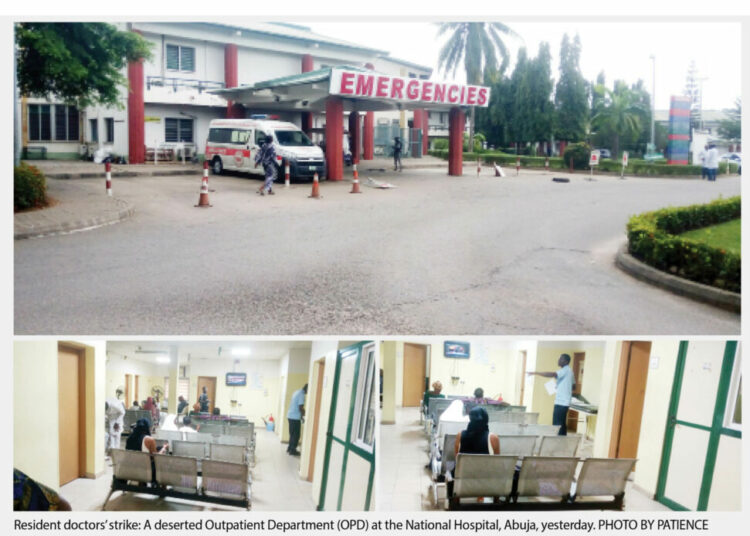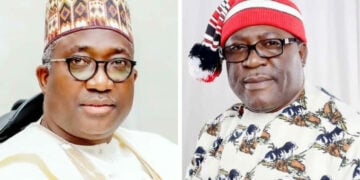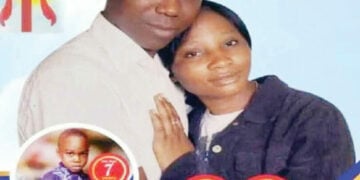Hospitals across the country were thrown into partial paralysis on Friday as resident doctors commenced a five-day nationwide warning strike, leaving patients stranded and services skeletal. The industrial action, which began at 8:00 a.m. on Friday, September 12, is expected to last until Tuesday, September 16, following the expiration of a 24-hour ultimatum given to the federal government by the Nigerian Association of Resident Doctors (NARD).
When one of our correspondents visited the National Hospital, Abuja, the usually busy Outpatient Department (OPD) was almost empty, with only a few patients waiting to be attended to. At the trauma center, five patients were admitted on Friday morning, four of whom were being treated after allegedly attacking a pregnant woman. They were being attended to by nurses, as a consultant had earlier treated the patients in the absence of resident doctors.
A patient, Mrs. Baba Hauwa, said she was referred from Garki General Hospital, Abuja, but was turned back and asked to return after the strike. Looking confused, she held a laboratory test result and expressed uncertainty about her next steps. “I was not aware of the strike,” she said. “I don’t know what to do now. My daughter was supposed to see a doctor before going back to school, but now I’m so confused about this whole situation,” she lamented.
Another patient, Mr. Moses Adeola, expressed gratitude for being seen by a consultant after a long wait. “I beg the government to address the doctors’ concerns because they are doing a great job. We can’t afford to go to France or London. The government needs to address the issues raised by the doctors,” he said.
A nurse, who wished to remain anonymous, explained that some doctors were present in the morning since the strike had just begun. “The situation will worsen in the coming days if nothing is done,” she warned.
The strike followed an Extraordinary National Executive Council (E-NEC) meeting of NARD, where doctors reviewed the government’s failure to meet their demands despite repeated ultimatums. Unresolved issues include non-payment of the 2025 Medical Residency Training Fund (MRTF), outstanding arrears from the CONMESS review, unpaid 2024 accoutrement allowance, salary arrears, and downgrading of membership certificates by the Medical and Dental Council of Nigeria (MDCN).
NARD President Dr. Tope Osundara stated that the five-day warning strike became inevitable after the government failed to meet the association’s minimum demands within the 24-hour grace period. This strike coincides with the Association of Resident Doctors under the FCT Administration’s seven-day warning strike, resulting in severe service disruptions in government hospitals across the country.
I Have Directed My Members To Hand Over To Available Consultants – Benue ARDs
In Benue State, the five-day warning strike embarked upon by the Association of Resident Doctors (ARDs) has crippled activities in public hospitals across the state. The president of ARDs, Federal Medical Centre, Makurdi, Dr. Emmanuel Tormusa, said in an interview that he has directed his members to hand over to available consultants who are not on strike.
According to him, “Immediately after the strike was announced at 8 a.m., I directed all resident doctors who were already at work in various units to hand over their patients to the consultants because they are not on strike. I also instructed them to leave the hospital as soon as they handed over until the federal government responds to our demands.”
When asked whether the demands of the ARDs working with the federal government are the same as those working in the state, Dr. Igba said, “Even if they are not the same, ‘an injury to one is an injury to all.’ If the state ARDs have issues, we cry with them, and if the ARDs at the federal level have issues, they also cry with us; we are working together.”
In another development, the President of ARDs, Benue State University Teaching Hospital (BSUTH), Dr. Igba Terhile, said that although they are yet to join the strike, they will join before the close of the day. Dr. Igba explained, “Yes, the strike has been declared by NARD, and once a strike is declared, all state branches of the association have to oblige. However, we are yet to join the strike because it was announced this morning at 8 a.m., and by then, most of the doctors were already at work performing various duties. We needed to sort out and arrange properly before we leave.”
Our correspondent, who visited FMC, saw some patients’ relatives arranging their bags with the plan of leaving the hospital. In an interview, one of them, who identified herself as a Member, said that instead of sleeping in the hospital with little or no attention, she will leave with her much better mother to continue with the prescribed medication at home.
Another patient’s relative, who spoke on condition of anonymity, said their father was in a critical condition. Instead of keeping him in the hospital and begging for treatment, he went to look for a vehicle to take their father to a private clinic for more attention. He called on the federal government to put resident doctors on the first line charge and ensure the prompt payment of their salaries and hazard allowances, as they are the ones doing the bulk of the work.
Although some patients’ relatives appeared stranded and were not in the mood to grant an interview, the situation and the strike’s impact were evident.
FMC Jalingo Complies, Consultants Burdened with Patients in Critical Condition
A visit to the Federal Medical Center, Jalingo, showed that the usually busy facility with patients seeking medical attention has reduced, as patients coming to the hospital for the first time were refused admission for care as of yesterday. From the entrance of the hospital to the premises and wards, a decline in the presence of people coming for treatment was witnessed, with most doctors complying with the national directives. Those seen attending to patients were consultants providing skeletal services to those with critical conditions.
It was observed that patients already responding to treatment had been discharged to seek care elsewhere. A relation of some patients, Aisha Isa, confirmed hearing about the strike, saying, “Those attending to them are different from those who have been coming.” She added that they were lucky to be attended to due to the critical condition of their relative.
Another patient’s relative, Barniki Tsokwa, said that although they still had some prescriptions, if no one came to check on them by the next day, they would have no option but to seek alternative care elsewhere. Tsokwa decried the strike action, saying that the masses would ultimately suffer the brunt.
A mother of one of the patients, Malama Aisha Ada, prayed for God’s intervention, noting that FMC Jalingo provides affordable services to the people. She hoped the strike wouldn’t extend beyond two days.
The Chairman of the Association of Resident Doctors at FMC Jalingo, Danjuma Chomo, said that consultants were still on the ground, providing care. “Our mandate is to hand over admitted patients to the consultants, who will take care of them. However, with the overwhelming number of patients and limited staff, the consultants can only do so much.”
Patients Unhappy, Want Government to Attend to Issues
Patients at federal health institutions have expressed dismay over the ongoing strike action by resident doctors. Some patients said they have concluded plans to move to private hospitals due to the strike.
In Enugu, total compliance with the strike directive was observed at federal institutions, leaving patients at the mercy of nurses. However, state-owned institutions saw partial compliance, with resident doctors providing skeletal services.
Some patients’ relatives said they would seek alternative care in private hospitals due to the strike’s impact on treatment. One patient noted, “We can’t afford to go abroad for treatment like President Bola Tinubu; we are battling with poverty here.”
Patients in Umuahia Hospitals Anxious as Services Stall
The public relations officer of the Federal Medical Centre, Umuahia, Darlington Madubuko, confirmed that the resident doctors are participating in the strike. Although the effect is minimal so far due to the weekend, patients are worried about not being attended to by doctors.
Inquiries indicated that patients in the intensive care unit or requiring urgent attention might be taken to private facilities before their conditions worsen. A middle-aged man, whose aged father is almost due for discharge after minor surgery, said he will wait until Monday before deciding on what to do.
A petty trader, Nkechi Ikwuakolam, who is on admission for an undisclosed ailment, said she can’t afford to go elsewhere due to financial constraints.
Residents Groan Over Strike in Jos
Some residents of Jos, the Plateau State capital, and its environs are groaning over the strike. At the Plateau State Specialist Hospital (PSSH), people were seen moving their loved ones to undisclosed locations for further medical attention.
Mr. Andrew Usman said he was booked to see an orthopedic surgeon but found the consulting rooms empty. He decided to wait until the strike is called off. Mrs. Sarah Johnson, who came from Jos South LGA, lamented that there were no doctors to attend to her despite bringing her X-ray results.
Consultants to the Rescue in Niger State
In Niger State, resident doctors joined the nationwide strike, but senior doctors and consultants filled the vacancies. When visited, services were still ongoing, albeit slowed down by the strike.
At the Federal Medical Centre, Bida, the resident doctors complied totally with the strike, with only consultants attending to patients. The Chief Medical Director, Abubakar Usman, confirmed receipt of the strike notice but said services were not stopped entirely.
Patients attested that services had slowed down due to the strike. Habiba Mohammed confirmed the slowdown, while Aliyu Usman noted that consultants only come on special days based on appointments, leading to long waiting times.
Services Paralyse in Imo Hospitals
The resident doctors in the Federal University Teaching Hospital, Owerri, have joined their colleagues across the country in the strike action, paralyzing the healthcare delivery system. When visited by LEADERSHIP Weekend, patients were seen with gloomy faces as doctors were not readily available to attend to them.
A patient, Uche Ibezim, lamented that the strike has paralyzed activities in the hospital and called on the federal government to take appropriate action to address the challenges facing the common man in accessing medical care. He urged the government to show sincerity in tackling the demands of resident doctors.
According to him, “The less privileged face harsh economic realities and are unable to afford medical care in private hospitals. The poor masses are really suffering in this country, deprived of adequate medical care. Now that the resident doctors are on strike, we have no option, as the poor cannot afford to pay for medical care in private hospitals.”
Urenna Amadi commented that the issue of resident doctors’ strikes seems to have become a recurring problem and appealed to the federal government to expedite action. She highlighted that the strike has affected her adversely, as she cannot afford private hospital services on her meager salary.
“I am a civil servant, managing my limited salary, and cannot afford to pay for private hospital services. I urge the government to negotiate and keep to the terms of the agreement, as the masses are suffering the consequences of this stalemate between the federal government and resident doctors.”





